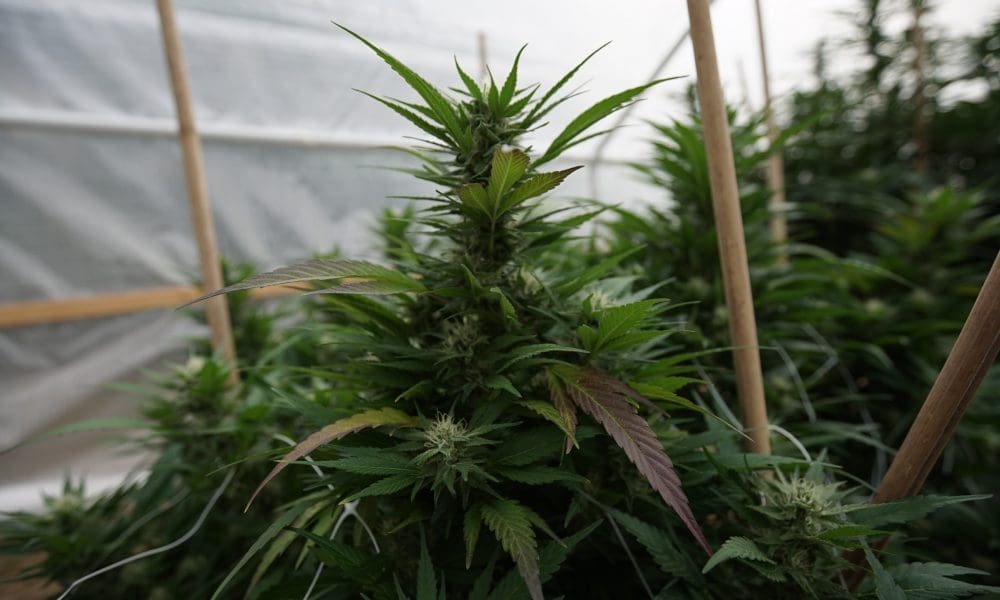featured
US House’s Intoxicating Hemp Ban, Texas Gubernatorial Clash Lead CBT’s Most Popular Stories in June
Published
6 hours agoon

Attempts to ban intoxicating hemp products nationwide and in Texas captured the attention of our Cannabis Business Times audience as the most-read storylines in June 2025.
At the federal level, the U.S. House Subcommittee on Agriculture, Rural Development, Food and Drug Administration advanced a must-pass spending bill on June 5 that included provisions to redefine hemp in a manner to close a “loophole” in the 2018 Farm Bill that has resulted in the proliferation of intoxicating cannabinoid products, such as those that contain delta-8 THC.
“As many states have stepped in to curb these dangerous products from reaching consumers, particularly children, it’s time for Congress to act to close this loophole while protecting the legitimate industrial hemp industry,” said Rep. Andy Harris, R-Md., the subcommittee’s chairman.
On June 23, the full Appropriations Committee voted along party lines, 35-27, to approve the spending bill, including the hemp provisions, sending it to the Rules Committee to be prepared for the House floor.
These two articles took the No. 1 and No. 4 spots in CBT’s Top 10 most-read articles this month.
An article about Texas Gov. Greg Abbott’s deadline for executive action on bills to expand the state’s medical cannabis program and to prohibit intoxicating hemp products took the No. 2 spot, and a follow-up article covering his veto of the hemp ban took the No. 3 spot.
“The legal defects in the bill are undeniable,” Abbott wrote in a June 22 veto proclamation. “If I were to allow Senate Bill 3 to become law, its enforcement would be enjoined for years, leaving existing abuse unaddressed. Texas cannot afford to wait.”
He leaned his argument on a 2023 preliminary injunction in Arkansas that the U.S. Court of Appeals for the Eighth Circuit vacated on June 24, two days after Abbott’s veto, pitting the governor against Lt. Gov. Dan Patrick, who spearheaded S.B. 3. The duo is lined up to spar over whether to ban or regulate hemp during a special session that’s set to begin July 21.
Other stories that readers did not want to miss out on this month included Pennsylvania Gov. Josh Shapiro’s push to keep an adult-use legalization proposal in the state budget and South Dakota setting a July 14 date to begin cracking down on noncompliant hemp product sales.
Don’t miss out on our Top 10 stories from June 2025.

Author: mscannabiz.com
MScannaBIZ for all you Mississippi Cannabis News and Information.
You may like
-


New York Lawmakers Send Governor Bill To Extend Marijuana Business Tax Return Deadlines
-


Celebrate the summer with a special promo offer from Al Capone
-


California Marijuana Tax Hike Will Take Effect Next Week After Lawmakers Omit Provisions To Delay It From Budget Bill
-


Leicestershire Police reveal inside of large cannabis farm in Burbage
-


New Michigan Bill Would Legalize Psilocybin For People With PTSD
-


Oregon Campaign To Legalize Cannabis Social Lounges Prepares To Submit First Signatures On Way To 2026 Ballot
featured
New York Lawmakers Send Governor Bill To Extend Marijuana Business Tax Return Deadlines
Published
32 minutes agoon
June 26, 2025
Both chambers of the New York State legislature have now passed legislation that would extend the deadline for some marijuana businesses to file electronic tax returns, sending the proposal next to the desk of Gov. Kathy Hochul (D).
If signed into law, the proposal would give cannabis manufacturers and distributors 30 extra days to submit their tax returns following the end of each quarterly tax period. Currently the companies have a 20-day window to file the documents, which the legislation would extended to 50 days.
“This will give extra time to complete accurate tax filings and create more flexibility as the market continues to mature,” lawmakers behind the measure said in a press release on Thursday. “Ultimately, this bill will provide a more realistic approach to the tax collection timeframe while promoting filing compliance and maintaining tax revenue and rates.”
Assemblywoman Donna Lupardo (D), the Assembly-side sponsor and chair of that chamber’s Agriculture Committee, said that while the retail side of the industry is more visible to New Yorkers, farmers and distributors are nevertheless a crucial piece of the legal market.
“We hope our effort to provide tax flexibility for NY’s cannabis manufacturers and distributors will succeed,” Lupardo said. “Although often unseen, they represent a critically important part of NY’s legal cannabis supply chain, without which the retail sector would not exist.”
Senate-side sponsor Sen. Jeremy Cooney (D), who chairs the chamber’s Cannabis Subcommittee, said that “cannabis farmers deserve the state’s help, and this bill would provide that much-needed relief.”
“I was proud to work with Assemblymember Lupardo and our colleagues in the legislature to get this done before the end of session, provide greater financial flexibility for our farmers, and show that we’re committed to building a thriving legal cannabis market in New York,” he said in a statement.
A cosponsorship memo attached to the bill explains:
“Under current law, the cannabis excise tax is paid quarterly by cannabis cultivators and processors to the NYS Department of Taxation and Finance. This excise tax payment schedule creates situations where product producers and processors often owe taxes before the product is sold to consumers. This legislation changes the tax collection payment schedule by allowing the option for the payment on or before the fiftieth day after each quarterly tax period.
The slow opening of cannabis dispensaries, due to multiple factors, has created a backlog of products on processors shelves, which have yet to be sent or sold to retailers, yet the tax is still owed. Another factor creating stress on the processor’s ability to pay the excise tax, is that some retail dispensaries are delinquent in paying for products they have received. There is a prompt payment provision in the cannabis law, but, due to many factors the provision is not being enforced. By allowing the tax to be collected on a more flexible schedule it will allow flexibility in the market as it matures and provides a financial lifeline to currently struggling producers and processors.”
Mack Hueber, president of the Empire Cannabis Manufacturer’s Alliance trade group, called the proposal (A5496/S3261) “a common-sense approach by the legislature to extend cannabis excise tax deadlines so that manufacturers and distributors have time to collect and accurately file hundreds of millions of dollars in excise tax revenue to New York State.”
“We applaud Senator Jeremy Cooney and Assemblymember Donna Lupardo for recognizing that our cannabis manufacturers are one of the state’s fastest-growing employment sectors, responsible for generating significant revenue that supports community grants, education funds, addiction services, and law enforcement,” he said in the release. “They have found a solution that takes into account both regulatory and on-the-ground realities that will not change or reduce tax revenues, but provide an additional 30 days to file at the end of each quarter. We look forward to Governor Hochul’s swift signing of A5496A/S8091.”
Sponsors of the bill noted that Hochul vetoed an earlier cannabis business tax reform proposal late last year, claiming it would “pose significant operational challenges for the State and confusion for taxpayers,” but that they’ve worked to address those concerns in the current version.
The earlier, vetoed measure would have allowed marijuana growers and processors to pay excise taxes on an annual basis rather than quarterly—a change that would have extended the same treatment to cannabis as the state already offers the alcohol industry.
Nicholas Guarino, the founder and CEO of cannabis business Jaunty, wrote in a recent op-ed for Marijuana Moment that the shift to an annual tax-filing system “would allow businesses to better manage cash flow, invest in growth initiatives and adapt more effectively to market demands as more stores open and more potential customers have access to a range of products.”
Earlier this month, meanwhile, New York officials announced the first round of grants under a $5 million program to help retail marijuana businesses owned by justice-involved people cover startup costs.
About three months after opening up applications for the Conditional Adult-Use Retail Dispensary (CAURD) Grant Program, the Office of Cannabis Management (OCM) and Empire State Development (ESD) announced on Wednesday that they have awarded 52 licensed dispensaries up to $30,000 each in funds meant for startup and operational costs such as rent, renovations, inventory tracking and security systems.
To qualify for the program, applicants need to have been “justice involved”—in other words, impacted by a marijuana-related conviction—and have some experience running a profitable business.
Meanwhile, OCM recently launched a new online map that’s meant to help adults locate licensed marijuana retailers—one of their latest efforts to encourage consumers to buy their cannabis from the regulated market.
After a rocky rollout of the state’s legalization law opened the door to a proliferation of illicit marijuana shops, the governor and regulators have prioritized educating the public about the need to purchase their products from licensed dispensaries as a health and safety imperative.
The broader New York campaign has also involved digital ads and educational resources, including a guide on safe consumption practices, as well as graphics and videos featuring licensed cannabis business owners and messaging about the benefits of participating in the regulated market.
OCM also advises that “continued enforcement against the illicit market is critical to building a health regulated market,” pointing to what it describes as successful enforcement efforts in 2024. Last spring, for example, officials in New York City launched Operation Padlock, an enforcement initiative meant to shutter illegal storefronts. Within months, licensed shops that were open before the operation began saw sales climb 105 percent, according to an OCM survey.
Regulators are also moving forward with new proposed regulations around the state’s so-called “cannabis showcase” program, which allows licensed businesses to sell to consumers at pop-up, farmers market-like events.
As originally authorized, the showcase events were largely in response to the slow rollout of New York’s adult-use marijuana program, which faced multiple delays in implementation amid litigation and other matters.
But the state’s industry has gradually expanded, with officials in January touting $1 billion in total sales since the market launched.
Separately Hochul signed state budget legislation that did not include a controversial earlier provision that would have allowed police to use the smell of marijuana as probable cause that a driver is impaired and then force them to take a drug test.
Amendments made in the legislature removed the provision, which a coalition of 60 reform groups had argued in a letter to Hochul and top lawmakers would “repeat some of the worst harms of the War on Drugs” and allow law enforcement to “restart unconstitutional racial profiling of drivers.”
A recent OCM report also found that the number of licensed marijuana retailers in the state grew by nearly threefold last year, fueling total sales in 2024 of nearly $870 million.
Including sales so far in 2025, New York’s legal cannabis market is now close to reaching $1.5 billion worth of purchases, OCM said in April.
Also that month, New York cannabis regulators and labor officials announced the launch of a workforce training program aimed at “providing comprehensive safety education to workers” in the state’s legal marijuana industry.
Separately, OCM’s press secretary recently indicated the office is working on plans to expand permitting and licensing rules that could allow adults to buy and consume marijuana at movie theaters. Authorizing sales of cannabis products at theaters would set New York apart as it continues to build upon the state’s legalization law.
Earlier this year, a collective of businesses licensed under the CAURD program called on Hochul to forgive tens of millions of dollars in high-cost loans issued under a governor-created social equity loan fund.
A state lawmaker said in December that there’s a need to extend financial aid to CAURD license holders, many of whom are struggling under the high-cost loans.
Critics—including the NAACP New York State Conference, Black Cannabis Industry Association, Minority Cannabis Business Association, Service Disabled Veterans in Cannabis Association, Drug Policy Alliance, NYC NORML and VOCAL-NY—wrote to the governor earlier that month to express dismay at what they described as marijuana regulators’ “efforts in service of big corporations at the expense of small business and equity outcomes.”
Photo courtesy of Chris Wallis // Side Pocket Images.

Author: mscannabiz.com
MScannaBIZ for all you Mississippi Cannabis News and Information.
featured
California Marijuana Tax Hike Will Take Effect Next Week After Lawmakers Omit Provisions To Delay It From Budget Bill
Published
2 hours agoon
June 26, 2025
A tax hike on marijuana products in California will take effect next week after lawmakers failed to include provisions to delay its implementation in key budget legislation on Wednesday.
State officials announced last month that the cannabis excise tax rate would increase from 15 percent to 19 percent on July 1, and advocates were holding out hope that the budget legislation would contain language similar to a standalone proposal from Assemblymember Matt Haney (D) to delay the change for five years.
That didn’t happen, however. And that’s despite Gov. Gavin Newsom’s (D) support for including the tax freeze in the budget trailer bill, MJBizDaily first reported. Assembly Speaker Robert Rivas (D) also backed the delay, but Senate President Pro Tempore Mike McGuire (D) reportedly blocked it from the budget legislation.
In a hearing before the Senate Budget and Fiscal Review Committee, Sen. Christopher Cabaldon (D) said he wished lawmakers “had reached an agreement on the cannabis tax increase.”
“I’m very concerned that this industry—that we’re going to see less revenue as a result of the increase than we would have without it, as well as severely hampering the legal industry and significantly advantaging the illicit and illegal activities around our state,” he said. “So I hope we remain committed to solving that issue. I know the tax increase is scheduled to take effect next week, but that remains a problem.”
Under Haney’s still pending standalone bill, which advanced through the Assembly earlier this month, the delayed implementation wouldn’t take effect until the beginning of 2026. Advocates wanted to see it included in the budget legislation because it would’ve taken effect upon enactment.
The standalone bill would make it so the California Department of Tax and Fee Administration (CDTFA), working with the Department of Finance, would be required to “adjust the cannabis excise tax rate upon purchasers of cannabis or cannabis products” based on the “additional percentage of the gross receipts of any retail sale by a cannabis retailer that the department estimates will generate an amount of revenue equivalent to the amount that would have been collected in the previous fiscal year,” the text says.
The department would need to “estimate the amount of revenue that would have been collected in the previous fiscal year pursuant to the weight-based cultivation tax” and “estimate this amount by projecting the revenue from weight-based cultivation taxes that would have been collected in the previous calendar year based on information available to the department.”
“The specific goal of the cannabis excise tax rate reduction is to provide immediate tax relief to the cannabis industry,” the measure states. “The efficacy of this goal may be measured by the Legislature by the amount of gain or loss in cannabis excise tax revenues resulting from the cannabis excise tax rate reduction allowed by this act.”
It also mandates that CDTFA, on or before December 1, 2026 and each subsequent year the California “submit a report to the Legislature…detailing the amount of gain or loss in cannabis excise tax revenues resulting from the cannabis excise tax rate reduction allowed by this act.”
—
Marijuana Moment is tracking hundreds of cannabis, psychedelics and drug policy bills in state legislatures and Congress this year. Patreon supporters pledging at least $25/month get access to our interactive maps, charts and hearing calendar so they don’t miss any developments.![]()
Learn more about our marijuana bill tracker and become a supporter on Patreon to get access.
—
Meanwhile, California officials are inviting research proposals for a second round of grants under a program meant to better educate the public on the state’s marijuana law and help policymakers make informed decisions on the issue.
Last month, the Governor’s Office of Business and Economic Development (GO-Biz) announced the recipients of over $52 million in community reinvestment grants to nonprofits and local health departments, also funded by marijuana tax revenue.
That marked the seventh round of cannabis-funded California Community Reinvestment Grants (CalCRG) under the state program.
Legalization in California has created a number of new grant programs aimed at addressing the consequences of marijuana prohibition and attempting to nurture a strong, well-regulated legal industry.
California’s Supreme Court separately delivered a victory for the state’s marijuana program last month, rescinding a lower court ruling in a case that suggested federal prohibition could be used locally to undermine the cannabis market.
The state Supreme Court ruling also came just weeks after California officials unveiled a report on the current status and future of the state’s marijuana market—with independent analysts hired by regulators concluding that the federal prohibition on cannabis that prevents interstate commerce is meaningfully bolstering the illicit market.
The governor did sign a bill in 2022 that would have empowered him to enter into interstate cannabis commerce agreements with other legal states, but that power was incumbent upon federal guidance or an assessment from the state attorney general that sanctioned such activity.
Meanwhile, a California Senate committee recently declined to advance a bipartisan bill that would have created a psilocybin pilot program for military veterans and former first responders.
New Michigan Bill Would Legalize Psilocybin For People With PTSD

Author: mscannabiz.com
MScannaBIZ for all you Mississippi Cannabis News and Information.
featured
New Michigan Bill Would Legalize Psilocybin For People With PTSD
Published
3 hours agoon
June 26, 2025
Michigan Democratic lawmakers havw introduced legislation that would exempt adults with PTSD from state laws against the possession, cultivation and use of psilocybin and psilocin, the two primary active components of psychedelic mushrooms.
If approved, HB 4686, from Rep. Mike McFall and six cosponsors, would effectively legalize the personal use and cultivation of the psychedelic substances by people with the diagnosis. The two-page bill would not create a regulated psychedelics system or change the legal status of the drugs more broadly.
McFall held a press conference on Wednesday about the measure, saying it “will help protect those suffering from PTSD so they can use their medicine without fear of the unnecessary legal risks that veterans seeking this treatment currently must navigate.”
“Our understanding of medicine is constantly evolving, and there has been a shift in treating PTSD with psychedelics over the last decade,” he said. “Preliminary research is promising that psilocybin has potentially life-changing effects for extended periods of time after treatment.”
Appearing with McFall was Michael G. Smith Jr., a retired U.S. Army sergeant who said he’d “had more success in the mitigation of my PTSD symptoms with microdosing psilocybin than all the talk therapy offered by the VA Healthcare System,” adding that he’d tried “all their therapies available” at the Department of Veterans Affairs (VA).
“As a veteran with PTSD, I am encouraged by the legislative efforts to decriminalize psilocybin since it has been clinically proven to mitigate and eliminate the symptomatology related to PTSD,” Smith said. “This is important considering the vast field of studies over 25 years that identify that PTSD can lead to coronary vascular diseases, atrial fibrillation and atrial flutter, which means there is an awesome opportunity to prevent veterans from developing life threatening heart conditions with the treatment of psilocyn.”
A press release from McFall notes that VA “has started research on veterans and treating their PTSD with psychedelics, including psilocybin,” and, citing the advocacy group Heroic Hearts Project, says that 80 percent of veterans experienced improvements in PTSD symptoms after a single psilocybin session.
The bill was officially introduced on Wednesday and has been referred to the House Committee on Families and Veterans.
Last year, Michigan lawmakers sent a letter to Congress, the U.S. Department of Defense and Department of Veterans Affairs (VA) urging them to prioritize research and investment in psychedelics and other “non-technology treatment options” to address psychological trauma from military service.
Several cities in Michigan have enacted local psychedelics decriminalization policies.
Separately in Michigan, a second Bigfoot and marijuana news story recently broke in the state during the span of a single month.
Previously, an alleged Bigfoot sighting in Monroe County last month sparked some creativity within the marijuana community when, earlier this month, the dispensary Uniq Cannabis started offering a free pre-roll to anyone who brought in photographic proof of the mythological creature.
More recently, a Sasquatch statue outside the separate retailer Higher Love, located in Menominee, is at the center of controversy. The exhibit became a talking point at the city planning commission’s meeting this month, where certain community members argued that the faux beast could attract the attention of youth—with one resident advising the panel to “think about what mascots they see in our community and how they are impacting children.”
Meanwhile, state officials earlier this year announced that the disbursement of nearly $100 million in marijuana tax revenue to over 300 cities and tribes across the state thanks to the state’s adult-use legalization law. That’s part of the overall $331 million in tax dollars Michigan is distributing across various initiatives.
The tax dollars will support various local infrastructure, education and other needed services, the state Treasury Department said.
Photo courtesy of Wikimedia/Mushroom Observer.

Author: mscannabiz.com
MScannaBIZ for all you Mississippi Cannabis News and Information.

New York Lawmakers Send Governor Bill To Extend Marijuana Business Tax Return Deadlines

Celebrate the summer with a special promo offer from Al Capone

California Marijuana Tax Hike Will Take Effect Next Week After Lawmakers Omit Provisions To Delay It From Budget Bill

Leicestershire Police reveal inside of large cannabis farm in Burbage

New Michigan Bill Would Legalize Psilocybin For People With PTSD

Oregon Campaign To Legalize Cannabis Social Lounges Prepares To Submit First Signatures On Way To 2026 Ballot

GOP Congressman Behind Hemp THC Ban Says He’s Not Worried About Potential Senate Opposition To The Proposal

US House’s Intoxicating Hemp Ban, Texas Gubernatorial Clash Lead CBT’s Most Popular Stories in June

Sunrise Smart Start: Nuclear plant, Marijuana in NY

What’s the proper way to transport medical marijuana in Florida?

FDA Plan To Include Hemp-Derived Cannabinoids In Federal Adverse Health Event Reporting System Goes To White House For Approval

Two In Three Wisconsin Voters Back Marijuana Legalization, New Poll Shows As Governor Predicts Reform In Next Session Under Democratic Control

Congress votes to let VA docs recommend medical cannabis for veterans (Newsletter: June 26, 2025)

Tilray Brands Subsidiary is First Company in Italy Approved to Distribute Medical Cannabis Flower

Michigan Cannabis Sales Fall, But Consumers Are Buying More at Dispensaries

Montana Gov. Vetoes Bill on Tribal Cannabis Agreements

Investigators: Crew broke into 4 dispensaries around Michigan

Thailand banning cannabis sales without a prescription 3 years after decriminalization

Marijuana Industry Workers Are The Happiest In Any Job Sector In The U.S., Survey Finds

Ohio Lawmakers Cancel Another Hearing On Bill To Alter Voter-Approved Marijuana Legalization Law Amid GOP Disagreements

Ohio Lawmakers Cancel Another Hearing On Bill To Alter Voter-Approved Marijuana Legalization Law Amid GOP Disagreements

Federal Court Upholds Arkansas Hemp Restrictions, Contradicting Texas Governor’s Stance In Vetoing Proposed Ban In His State

NORML Op-Ed: Debunking Cannabis Potency Myths

Report 15% of NY Adults Use Cannabis

Alert: Department of Cannabis Control updates data dashboards with full data for 2023

Connecticut Appoints The US’s First Cannabis Ombudsperson – Yes there is a pun in there and I’m Sure Erin Kirk Is Going To Hear It More Than Once!

5 best CBD creams of 2024 by Leafly

Free delta-9 gummies from Bay Smokes
New Study Analyzes the Effects of THCV, CBD on Weight Loss

EU initiative begins bid to open access to psychedelic therapies

Mississippi city official pleads guilty to selling fake CBD products

Curaleaf Start Process Of Getting Their Claws Into The UK’s National Health System – With Former MP (Resigned Today 30/5/24) As The Front Man

May 2024 Leafly HighLight: Pink Runtz strain

5 best autoflower seed banks of 2024 by Leafly

Horn Lake denies cannabis dispensary request to allow sale of drug paraphernalia and Sunday sales | News

Discover New York’s dankest cannabis brands [September 2024]

Nevada CCB to Accept Applications for Cannabis Establishments in White Pine County – “Only one cultivation and one production license will be awarded in White Pine County”

Press Release: CANNRA Calls for Farm Bill to Clarify Existing State Authority to Regulate Hemp Products

Local medical cannabis dispensary reacts to MSDH pulling Rapid Analytics License – WLBT

6 best CBD gummies of 2024 by Leafly

5 best THC drinks of 2024 by Leafly

The Daily Hit: October 2, 2024

5 best delta-9 THC gummies of 2024 by Leafly

Weekly Update: Monday, May 13, 2024 including, New Guide for Renewals & May Board meeting application deadline

People In This State Googled ‘Medical Marijuana’ The Most, Study Shows

Thailand: Pro-cannabis advocates rally ahead of the government’s plan to recriminalize the plant

PRESS RELEASE : Justice Department Submits Proposed Regulation to Reschedule Marijuana

Press Release: May 9, STIIIZY and Healing Urban Barrios hosted an Expungement Clinic & Second Chance Resource Fair
Trending
-

 California Cannabis Updates1 year ago
California Cannabis Updates1 year agoAlert: Department of Cannabis Control updates data dashboards with full data for 2023
-

 Breaking News1 year ago
Breaking News1 year agoConnecticut Appoints The US’s First Cannabis Ombudsperson – Yes there is a pun in there and I’m Sure Erin Kirk Is Going To Hear It More Than Once!
-

 best list11 months ago
best list11 months ago5 best CBD creams of 2024 by Leafly
-

 Bay Smokes12 months ago
Bay Smokes12 months agoFree delta-9 gummies from Bay Smokes
-

 cbd1 year ago
cbd1 year agoNew Study Analyzes the Effects of THCV, CBD on Weight Loss
-

 Business9 months ago
Business9 months agoEU initiative begins bid to open access to psychedelic therapies
-

 Mississippi Cannabis News1 year ago
Mississippi Cannabis News1 year agoMississippi city official pleads guilty to selling fake CBD products
-

 Breaking News1 year ago
Breaking News1 year agoCuraleaf Start Process Of Getting Their Claws Into The UK’s National Health System – With Former MP (Resigned Today 30/5/24) As The Front Man



